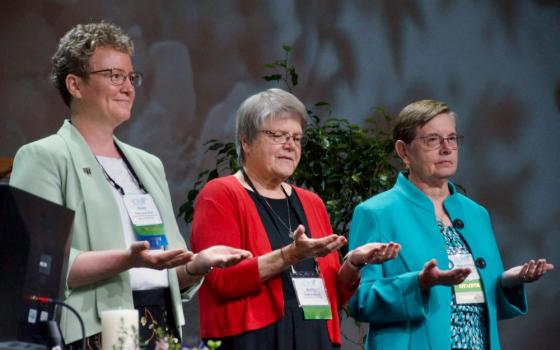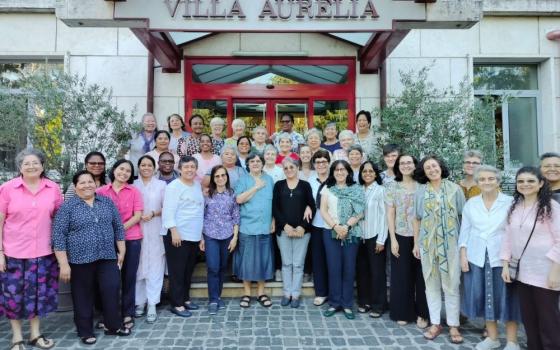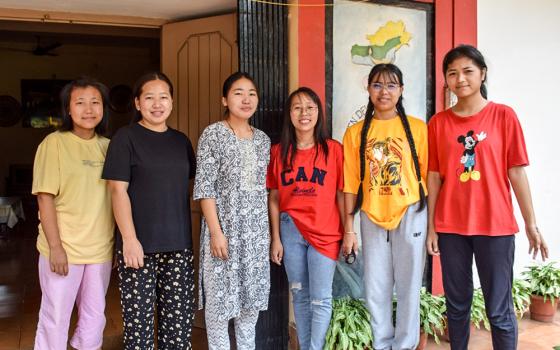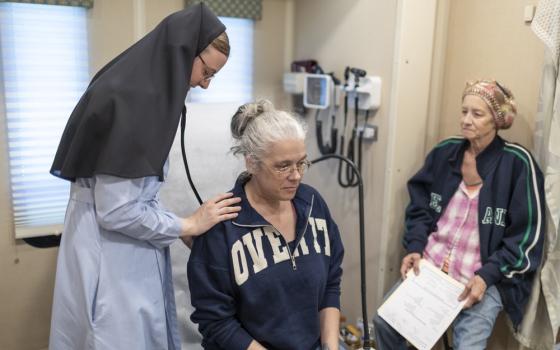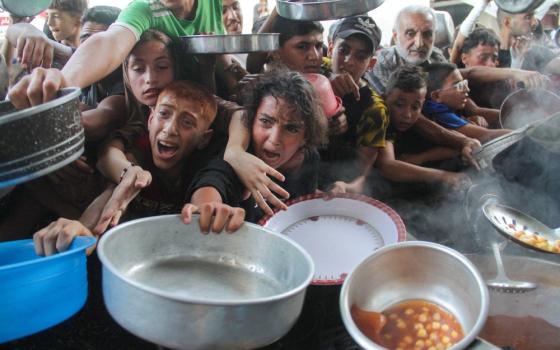Sr. Lipy Gloria Rozario, a sister of the Our Lady of Sorrows, observes a training session hosted by Healing Heart Counseling Unit, which she founded in Bangladesh in 2010. (GSR photo/Stephan Uttom Rozario)
Dr. Sr. Lipy Gloria Rozario, a sister of the Our Lady of Sorrows, is a counseling psychologist, founder and director of the Healing Heart Counseling Unit, providing services since 2010 in Muslim-majority Bangladesh.
She is an adjunct faculty member of the Department of Educational and Counseling Psychology at the University of Dhaka, the country's top public university. She completed her bachelor's degree at Libera L'universita Maria Santissima Assunta, Rome, Italy, in 2005 and completed her double masters in spirituality (2008) and counseling (2010) from Santa Clara University, California.
She is passionate about the dissemination of counseling services and provides training related to professional counseling at Healing Heart Counseling Unit and for NGOs and religious organizations. Her speciality is building awareness in the country through social media and seminars in schools. She believes students from grades 6 to 12 need these counseling services and mental health support.
Rosario, the sixth of nine children, was born in 1971 during Bangladesh's war of independence with Pakistan.
She entered Our Lady of Sorrows at 18 years old in 1990. She entered the novitiate in Italy in 1993 and took her first vows in 1995. She moved to Bangladesh in 1995 and took her final vows in 2001.
Rosario recently talked to Global Sisters Report about her ministry, her service to students, the mental health situation in the country and how her work relates to Christ's work.
Global Sisters Report: Can you please explain what the vision of the Healing Heart Counseling Unit is?
Rozario: Healing Heart Counseling Unit's vision is to create a happy, healthy, prosperous and peaceful world for all by applying a skilled and professional approach and knowledge of counseling psychology. We make counseling services accessible and affordable for every individual in need irrespective of color, creed, caste, religion, political and socioeconomic status. We have worked with students, trained volunteers and the development organization's employees, and provided individual counseling.
A statue of the Virgin Mary stands in a corner at the Healing Heart Counseling Unit in Dhaka, Bangladesh. (GSR photo/Stephan Uttom Rozario)
Why do Bangladeshi students need mental health awareness?
I do volunteer work in schools and colleges to give mental health awareness. This mental health awareness is very useful in schools, especially in grades 6 to 12. During this time, boys and girls undergo various physical changes, during the adolescent period. They are very confused, and many are afraid. Mental health problems can be diagnosed between the ages of 16 and 24. So, this age is critical.
We have conducted seminars on health care in 18 schools so far. We send proposals to various schools on our end to take up this service, but the school's authority prioritizes their education and other activities.
What other problems do students have that require mental health awareness?
Not getting good results, they are affected due to not getting jobs after completing their studies, they are suffering due to the conflict between parents, etc., and to remove that affects awareness and counseling is necessary. Not only students, but their parents need counseling.
Why do parents need counseling?
Parents need mental health counseling to grow with their children. Many parents pressure their children for good academic results. But not every student has the equal capacity to get good results. So students sometimes get upset due to pressure from their parents. Again, when they don't get the job, parents often criticize their results.
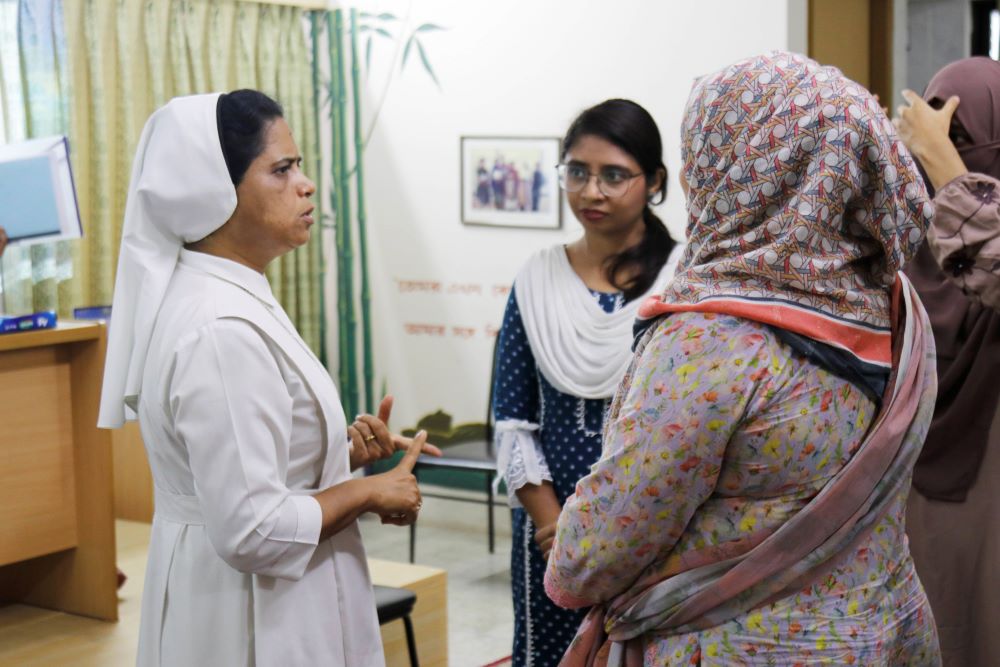
Trainees, most of whom are Muslim, discuss counseling with Sr. Lipy Gloria Rozario, a sister of the Our Lady of Sorrows. (GSR photo/Stephan Uttom Rozario)
What is the solution?
In that case, students and parents both need to change their mind setup and that is possible through counseling. Students need more mental power to cope with criticism and parents need to understand their children's mental health issues.
Who are your major clients except for awareness in educational institutions?
Apart from students, I and the counselors in my office provide counseling to individuals, families and various professionals, especially development workers. We provide mental health training to people working in various development organizations so that they can apply it to the general people. Besides, we also provide counseling for the Rohingya community in camps in Bangladesh.
Can you talk about the mental health situation in Bangladesh and how it can be addressed?
According to the latest data from the National Mental Health Survey 2018-2019, more than 18 percent of adults (above 18 years of age) in Bangladesh suffer from some form of mental illness, and 12.6 percent of adolescents (ages 7-17) are diagnosed with mental illness. One in every five women in the country is suffering from mental problems.
People still don't think about the need to take care of mental health. But if he is mentally ill, then he has nothing left in his life but people still don't understand that. And those who understand, they come to us and get service. We have about 40 people coming here every week, most of whom are Muslims.
I think there is more awareness among people than before, but there is no way to solve this problem except to make people more aware.
Advertisement
Does this profession help you to spread Christianity to other religions and how?
Jesus Christ taught and healed the sick and that is what I do. Healing the sick in the Bible, especially the Gospel of Mark, contains more of Jesus' miracles and teachings, which are my favorites.
Through me, I think the word of Christ is being preached. Because I have a lot of Muslim people coming here and when they see my work, I think they know and see Jesus Christ in me. My center has Jesus' sayings and many pictures which I think are spreading Christ's word.
What is your and your organization's plan?
The plan with this center is that within 10 years from today, I will move not only to Dhaka but also outside Dhaka. And I will go to the villages after closing this center, because there are people to provide services in the city but such service is not available in villages.

